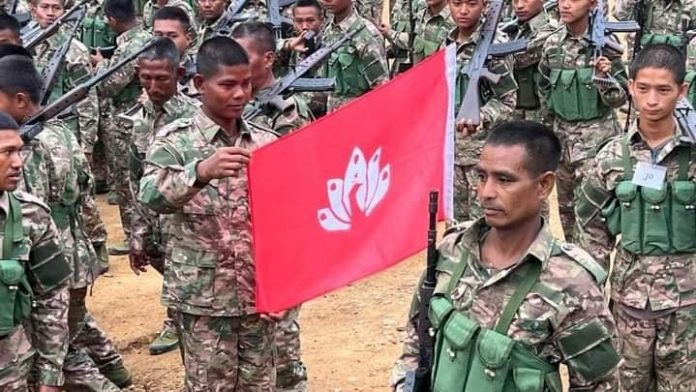The military regime in Naypyidaw called on ethnic armed groups and the People’s Defense Force (PDF), which have united to resist the 2021 coup, to abandon violence and take the “political path” as a part of its planned elections tentatively scheduled for November 2025, regime media reported on Thursday.
This unexpected offer from the regime comes after the military has suffered unprecedented losses on the battlefield at the hands of anti-coup resistance groups since the Brotherhood Alliance launched Operation 1027 on Oct. 27.
The regime has declared the PDF and the Brotherhood Alliance members, the Myanmar National Democratic Alliance Army (MNDAA), the Ta’ang National Liberation Army (TNLA) and the Arakan Army (AA), as terrorist organizations.
Under Myanmar’s Counter-Terrorism Law any person or group making contact with, or being a member of, an organization deemed “terrorist” can face up to two years in prison or a fine up to the equivalent of $60,000 USD.
Even though the regime invited the PDF to participate in the dialogue, it made no mention of Myanmar’s civilian-led National Unity Government (NUG), a group of elected lawmakers, ethnic nationality leaders, and resistance groups, which claim they are prepared to return the country to its democratic path and make it a more inclusive federal democratic union.
“It is merely an attempt to manipulate the political situation and gain international recognition. This is just an effort to divide the revolutionary forces as the military is facing losses nationwide,” Kyaw Zaw, the NUG spokesperson, told DVB.
Aung San Myint, a secretary with the Karenni National Progressive Party (KNPP), told DVB that Karenni resistance forces will not accept any election that is held under the 2008 constitution, which enshrines the military’s political supremacy into law.
The Karen National Union (KNU), the Kachin Independence Army (KIA), and the Bamar People’s Liberation Army (BPLA) – founded in opposition to the 2021 coup – have also declined the regime’s invitation to join its planned election.
Despite the military’s overtures, it has intensified airstrikes on areas controlled by resistance groups nationwide, as ordered by regime leader Min Aung Hlaing on a visit earlier this month to the Shan State capital Taunggyi.
DVB data reported that between Sept. 9-18, a total of 31 airstrikes killed 64 and injured 26 civilians in six out of 12 townships targeted over the nine days. This occurred while regime media called for a temporary ceasefire during the nationwide response to floods and landslides caused by the remnants of Typhoon Yagi, which struck Myanmar on Sept. 9.
The military has also been planning to launch counter offensives to regain control of territory it lost to the Brotherhood Alliance and other ethnic armed resistance groups across the country, especially in Shan, Kachin, Karen, Karenni and Arakan states.
Most of Myanmar’s major political parties – including the National League for Democracy (NLD) party led by Aung San Suu Kyi – have declined to participate in a regime-run election and have thus been dissolved by the Union Election Commission (UEC). Political analysts have told DVB that Naypyidaw views an election as a way to legitimize military rule.
“The [regime] cannot be trusted at all, not after the daily atrocities since the coup. But this puts the [ethnic armed groups] and NUG in an invidious position,” said David Mathieson, an independent analyst on Myanmar’s conflict. “War weariness is rising across many communities.”
Nan Lwin, a Myanmar-China expert at the think tank Institute for Strategy and Policy (ISP Myanmar), told DVB that the military likely made the offer to resistance groups partly due to pressure from Beijing.
“China has urged the [regime] to address political deadlock [and] has encouraged holding elections, particularly emphasizing the inclusion of all possible political parties. China appears to view the [Naypyidaw] statement as a step towards their proposal,” added Nan Lwin.
A 2024 survey conducted by the Singapore-based research group ISEAS – Yusof Ishak Institute with people inside Myanmar found that 76 percent of the respondents do not believe that elections will end Myanmar’s crisis. Over 76 percent of those surveyed stated that they did not intend to vote in any regime-run election.
Myanmar’s decades-long conflict has significantly escalated since the military overthrew the NLD government. State Counsellor Aung San Suu Kyi and President Win Myint have been jailed and held incommunicado by the regime since the coup on Feb. 1, 2021.
Nada Al-Nashif, the U.N. Deputy High Commissioner for Human Rights, told the U.N. Human Rights Council on Tuesday that the crisis in Myanmar unfolding since 2021 is “an abyss of human suffering.”



